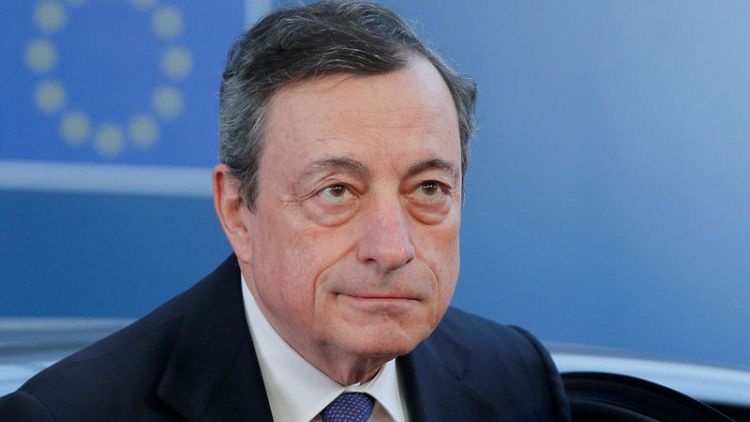By Mark John
LONDON, Oct 22 - (Reuters) - Mario Draghi hands over power at the European Central Bank to Christine Lagarde amid fierce debate over the ultra-loose money policies he spearheaded to aid a eurozone recovery from the financial crisis.
Led by German and Dutch central bank chiefs, dissenters on the ECB's Governing Council fear a reliance on negative interest rates and the re-launch of stimulus at the rate of 20 billion euros (£17 billion) a month are storing up problems for later. The following are the main concerns expressed by them and others.
BAD FOR SAVERS?
The critics argue that low interest rates hurt European savers, many of them elderly, by destroying their returns on investment. "Count Draghila is sucking our accounts dry," complained a Sept. 13 headline in German newspaper Bild next to a photomontage of Draghi with fangs. A Deutsche Bank study found that low rates were costing European savers some 160 billion euros a year.
Others argue they should not complain too much as at least they do not have to contend with high inflation eroding what small gains they do get. Citing Bundesbank data, the Centre for European Reform said that in the 200 months since 2000, savers have only had positive real rates - that is, savings rates minus inflation - in 34 of them.
SQUEEZING BANKS
The debate over the impact of low and negative rates on European banks is scarcely less impassioned. In a note last month on what it called "central bank mania for lower-forever rates", Bank of America-Merrill Lynch said the traditional banking model was being destroyed. It gave the example of a small bank branch with operating costs of 400,000 euros a year that would have to amass some 40 million euros in deposits to cover running costs if it was only earning 1% on those deposits; it concluded that many branches would find that impossible and would close.
ECB policy-makers cite other factors - such as competition from U.S. banks - for weak European banking profits and urge them to innovate, diversify, cut costs and consolidate across national borders. They also point to increases in bank lending to argue that, in fact, ultra-low rates are having their intended effect.
HOUSING BUBBLES
In its Global Real Estate Bubble Index for this year, UBS said low rates were creating the risk of property bubbles in cities including Munich, Amsterdam and Frankfurt, home to the ECB itself. But it also noted that price growth was easing off in many places, among them Amsterdam.
In a February report this year, the European Systemic Risk Board (ESRB) set up after the financial crisis to spot future risks said it was not seeing evidence of home buyers taking on bigger loans despite the low rates. However Dutch central bank chief Klaas Knot, a frequent critic of ECB policy, last month warned there were signs of "excessive risk-seeking behaviour" in housing markets.
ZOMBIE COMPANIES
Austrian central bank Governor Robert Holzmann last month cited the risk of "negative company dynamics" from negative rates. He did not elaborate on what he meant but there is evidence that one downside of low rates is to allow cheap borrowing to so-called "zombie" companies that would normally be too weak to exist.
A Bank of International Settlements' (BIS) report last year estimated that the number of such companies had increased six-fold since the era of high interest rates in the 1980s. Zombie firms are a problem for the overall economy because they are less productive and can drain investment and labour away from healthier companies.
PENSIONS AND INSURANCE
Combining low interest rates with the demands of an ageing population, raises big long-term questions about how to fund retirement in those countries that rely on returns from investment funds for their pension systems.
Nowhere is that truer than for the Dutch pension system, until now among the most stable and generous in the world. Beyond the damage they do to current investment yields, stubbornly low rates mean Dutch pension funds have to put away more money to meet their future payouts - thus increasing their liabilities and forcing them to consider cuts to current pension payouts.
The same logic is at play for insurance companies and their liabilities; Oliver Baete, chief of insurance giant Allianz, is one of Draghi's fiercest critics.
SO WHAT NEXT?
Lagarde has signalled a review of ECB policy and her eight-year presidency will be characterised by soul-searching among central bankers about the way it carries out its mandate and what that means for financial players. "What has shifted this year is the growing realisation that these unconventional tools were not a temporary measure," said Anatoli Annenkov, senior European economist at Societe Generale. "Everyone is starting to feel that actually this will be with us for another 10 years."
(Reporting by Mark John; Editing by Lisa Shumaker)



